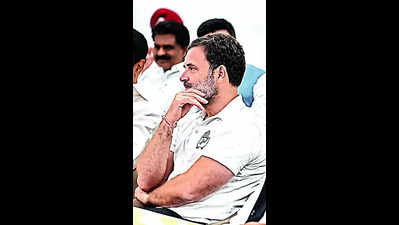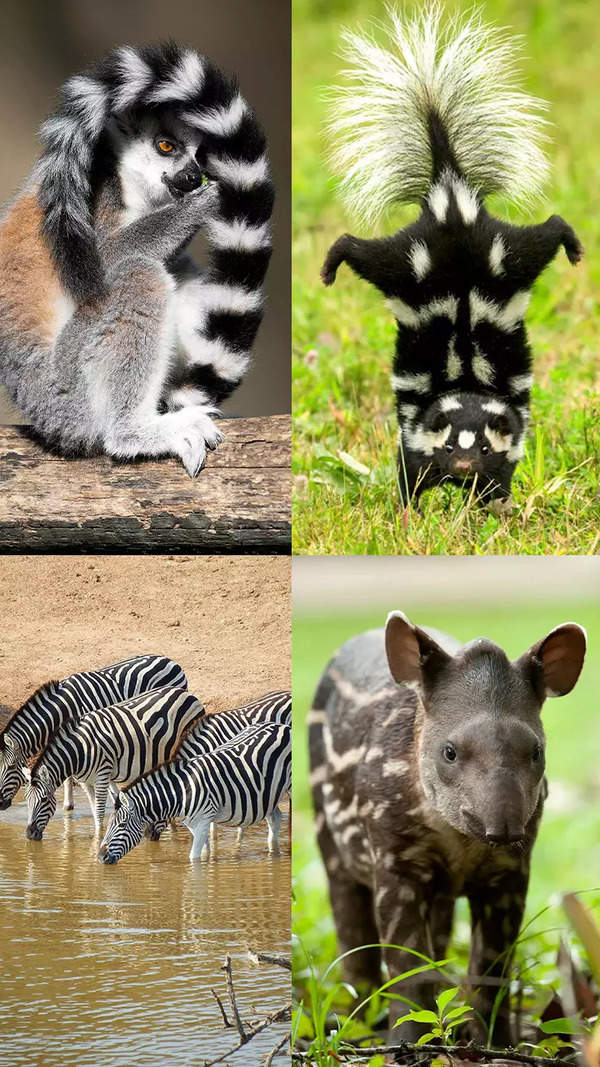- News
- City News
- guwahati News
- PM Narendra Modi’s absence, discontent helped Congress win in Manipur
Trending
PM Narendra Modi’s absence, discontent helped Congress win in Manipur
Congress's victory in Manipur's elections signals people's resilience and dissatisfaction with current leadership, emphasizing the significance of Rahul Gandhi's visits and the Bharat Jodo Nyay Yatra starting from Thoubal.

Congress leader Rahul Gandhi during a meeting of the INDIA bloc in New Delhi on Wednesday
GUWAHATI: The one-year-long ethnic conflict in the heart of India's northeastern region, Manipur, deeply affected its multi-ethnic groups, resulting in the collective mandate of these communities going against the NDA as the conflict significantly impacted their lives and changed the political dynamics in the Lok Sabha elections.
The Kukis, Meiteis, Nagas and the Muslims, who historically coexisted in a blend of harmony and tension, overwhelmingly voted in favour of the Congress, which won the two Lok Sabha seats, defeating BJP in Inner Manipur in the valley and NDA partner, NPF, in the hills.
Analysts say the continuation of the ethnic conflict, albeit sporadically, coupled with perceived negligence from the central government in New Delhi, fuelled the widespread discontent among the state's residents.
The newly elected 50-year-old Outer Manipur MP, Arthur said that he got maximum votes from all communities, “be it from Muslims, Nagas, Meiteis and Kukis.”
Arthur, a Naga, is a former vocalist in a band who later became a journalist who became a Congress MLA in 2017 from Ukhrul constituency.
Inner Manipur winner Akoijam cautioned, “Its clear message, don’t take people of this state for granted.” The 57-year-old assistant professor at the Centre for the Study of Social Systems in JNU, made his electoral debut this election.
A significant point of contention has been Prime Minister Narendra Modi's absence from the state during these trying times. This absence was perceived not merely as a physical absence but as a symbolic neglect of the state's dire need for attention and intervention from the highest levels of government.
In stark contrast, Congress leader Rahul Gandhi made two visits to Manipur amidst the ongoing ethnic conflict. He met the Meities, Kukis, Nagas and the Muslims. His presence in Manipur, and his engagement with the issues faced by its people, offered what many in the state felt was sorely lacking from the central leadership: attention and a willingness to listen.
These visits were not just political manoeuvres but were seen as gestures of solidarity and acknowledgment of the state's plight.
BJP also sent Amit Shah twice. Once for assessment of the deepening conflict and holding meetings with stakeholders and on the other occasion he went to campaign for the party, ahead of the Lok Sabha polls.
This distinction between the actions of two leaders became a focal point in the elections, with the electorate viewing Gandhi's visits as an embodiment of the concern and involvement they yearned for from their national leaders. The turning point was the Bharat Jodo Nyay Yatra of Rahul Gandhi, which was kicked off from in Manipur’s Thoubal in January.
The collective anger and dissatisfaction with the handling of the ethnic conflict, and the absence of significant figures like Modi, have coalesced into a powerful electoral response.
People’s anger was powerfully reflected when Congress candidate in Inner Manipur, Angomcha Bimol Akoijam achieved a winning margin surpassing 1,00,000 votes, his colleague Alfred Kanngam S Arthur won Outer Manipur with a margin over 85,000—a testament to the depth of sentiment among the electorate.
Manipur traditionally votes in large numbers and this year was no exception. The high voter turnout, slightly higher than usual, was indicative of the people's eagerness to make their voices heard, to express their frustration, and to seek a new direction for their state.
People of Manipur have sent powerful signal by electing Cong MPs: Ramesh
What was striking was they came out in large numbers to vote against the govts at the Centre and the state. More than 47% of votes were polled in favour of the two Congress candidates. BJP's vote share was just about 16% while its partner NPF’s was slightly better at 18%. AICC leader Jairam Ramesh summed up his party’s thumping win in Manipur as a “powerful signal” by “The long-suffering people of Manipur, whose resilience and strength has been under major strain since the state began burning on the night of May 3rd 2023.”
Ramesh wrote on X that “It (victory) is also a tribute to @RahulGandhi’s visit to Manipur on 29th and 30th June 2023, and to the launch of the Bharat Jodo Nyay Yatra on January 14th, 2024 from Thoubal, when the state Govt refused permission for it to start from Imphal.” The election has also been seen as a referendum on the leadership of Biren Singh, the state CM, with voters expressing their disapproval of his administration's approach to the conflict.
Biren congratulated the two Congress candidates and acknowledged the people’s mandate. “What truly matters is that we all aspire for the welfare of all the indigenous people of the state” and pledged BJP’s “commitment to work towards serving the masses and building a better Manipur for the future generations.” Experts say the recent elections in Manipur have been a watershed moment for the state, sending a clear message to both the state and Centre about the urgent need for a more responsive, engaged, and empathetic approach to governance, especially in times of crisis.
The Kukis, Meiteis, Nagas and the Muslims, who historically coexisted in a blend of harmony and tension, overwhelmingly voted in favour of the Congress, which won the two Lok Sabha seats, defeating BJP in Inner Manipur in the valley and NDA partner, NPF, in the hills.
Analysts say the continuation of the ethnic conflict, albeit sporadically, coupled with perceived negligence from the central government in New Delhi, fuelled the widespread discontent among the state's residents.
The newly elected 50-year-old Outer Manipur MP, Arthur said that he got maximum votes from all communities, “be it from Muslims, Nagas, Meiteis and Kukis.”
He attributed the victory of Congress as people understanding “what is reality and the fiction that was sold to them by BJP. I guess people are informed and they voted a party that lives in reality.”
Arthur, a Naga, is a former vocalist in a band who later became a journalist who became a Congress MLA in 2017 from Ukhrul constituency.
Inner Manipur winner Akoijam cautioned, “Its clear message, don’t take people of this state for granted.” The 57-year-old assistant professor at the Centre for the Study of Social Systems in JNU, made his electoral debut this election.
A significant point of contention has been Prime Minister Narendra Modi's absence from the state during these trying times. This absence was perceived not merely as a physical absence but as a symbolic neglect of the state's dire need for attention and intervention from the highest levels of government.
In stark contrast, Congress leader Rahul Gandhi made two visits to Manipur amidst the ongoing ethnic conflict. He met the Meities, Kukis, Nagas and the Muslims. His presence in Manipur, and his engagement with the issues faced by its people, offered what many in the state felt was sorely lacking from the central leadership: attention and a willingness to listen.
These visits were not just political manoeuvres but were seen as gestures of solidarity and acknowledgment of the state's plight.
BJP also sent Amit Shah twice. Once for assessment of the deepening conflict and holding meetings with stakeholders and on the other occasion he went to campaign for the party, ahead of the Lok Sabha polls.
This distinction between the actions of two leaders became a focal point in the elections, with the electorate viewing Gandhi's visits as an embodiment of the concern and involvement they yearned for from their national leaders. The turning point was the Bharat Jodo Nyay Yatra of Rahul Gandhi, which was kicked off from in Manipur’s Thoubal in January.
The collective anger and dissatisfaction with the handling of the ethnic conflict, and the absence of significant figures like Modi, have coalesced into a powerful electoral response.
People’s anger was powerfully reflected when Congress candidate in Inner Manipur, Angomcha Bimol Akoijam achieved a winning margin surpassing 1,00,000 votes, his colleague Alfred Kanngam S Arthur won Outer Manipur with a margin over 85,000—a testament to the depth of sentiment among the electorate.
Manipur traditionally votes in large numbers and this year was no exception. The high voter turnout, slightly higher than usual, was indicative of the people's eagerness to make their voices heard, to express their frustration, and to seek a new direction for their state.
People of Manipur have sent powerful signal by electing Cong MPs: Ramesh
What was striking was they came out in large numbers to vote against the govts at the Centre and the state. More than 47% of votes were polled in favour of the two Congress candidates. BJP's vote share was just about 16% while its partner NPF’s was slightly better at 18%. AICC leader Jairam Ramesh summed up his party’s thumping win in Manipur as a “powerful signal” by “The long-suffering people of Manipur, whose resilience and strength has been under major strain since the state began burning on the night of May 3rd 2023.”
Ramesh wrote on X that “It (victory) is also a tribute to @RahulGandhi’s visit to Manipur on 29th and 30th June 2023, and to the launch of the Bharat Jodo Nyay Yatra on January 14th, 2024 from Thoubal, when the state Govt refused permission for it to start from Imphal.” The election has also been seen as a referendum on the leadership of Biren Singh, the state CM, with voters expressing their disapproval of his administration's approach to the conflict.
Biren congratulated the two Congress candidates and acknowledged the people’s mandate. “What truly matters is that we all aspire for the welfare of all the indigenous people of the state” and pledged BJP’s “commitment to work towards serving the masses and building a better Manipur for the future generations.” Experts say the recent elections in Manipur have been a watershed moment for the state, sending a clear message to both the state and Centre about the urgent need for a more responsive, engaged, and empathetic approach to governance, especially in times of crisis.
End of Article
FOLLOW US ON SOCIAL MEDIA











